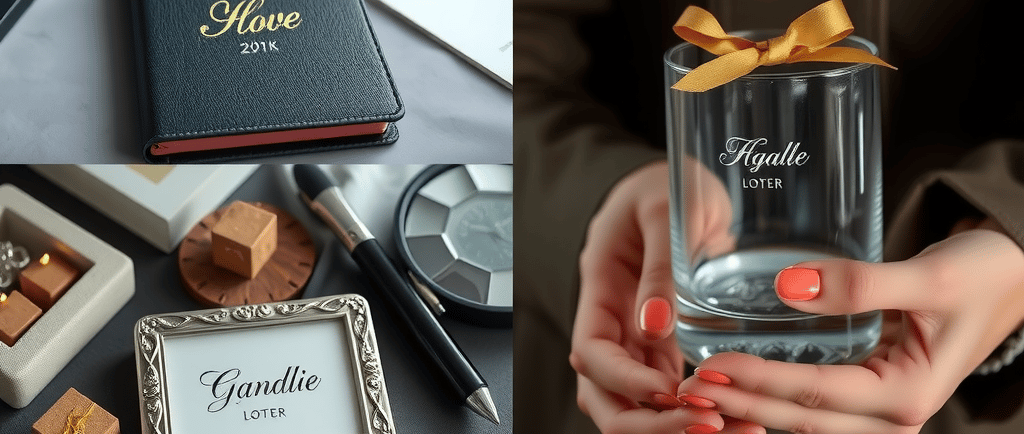Why Personalized Gifts Create Stronger Emotional Connections
The act of giving personalized gifts taps into fundamental human psychology, creating emotional bonds that extend far beyond the material value of the item itself. Understanding why personalization resonates so deeply helps both gift-givers and businesses create more meaningful connections that last long after the initial exchange.
Stitch And Spark studio
7/23/20255 min read


Personalized gifts succeed because they address core human needs for recognition, belonging, and significance. When someone receives a gift that acknowledges their individuality, interests, or relationship with the giver, it validates their identity and importance in a way that generic gifts simply cannot achieve.
The Psychology of Recognition and Validation
Human beings possess an innate need to be seen, understood, and acknowledged as unique individuals. Personalized gifts fulfill this need by demonstrating that the giver has invested time and thought into understanding the recipient's preferences, interests, and personality. This recognition creates a powerful emotional response that strengthens the bond between giver and receiver.
When someone receives a gift that incorporates their name, photo, or personal details, it triggers a psychological response known as the "name-letter effect" or "implicit egotism." This phenomenon describes how people show unconscious preference for things that remind them of themselves, including letters in their names, numbers in their birthdates, and items that reflect their identity.
Personalized gifts also activate the psychological principle of "felt understanding," where recipients perceive that the giver truly comprehends their personality, needs, and preferences. This perception of being understood creates emotional intimacy and strengthens relationship bonds in ways that generic gifts cannot replicate.
The validation aspect of personalized gifts extends beyond simple recognition to include acknowledgment of the recipient's roles, achievements, and relationships. A custom gift that celebrates someone's role as a parent, their professional accomplishments, or their hobbies validates these important aspects of their identity and demonstrates that the giver values these elements of who they are.
Memory Formation and Emotional Anchoring
Personalized gifts create stronger memories because they engage multiple cognitive processes simultaneously. The surprise of receiving something custom-made, the pleasure of recognition, and the emotional impact of feeling understood all combine to create what psychologists call "elaborative encoding"—a process that creates more detailed and lasting memories.
These gifts often become "emotional anchors" that trigger positive memories and feelings about the giver and the occasion long after the initial exchange. Each time the recipient uses or sees the personalized item, they're reminded not just of the gift itself, but of the thoughtfulness, care, and relationship it represents.
The uniqueness of personalized gifts also contributes to their memorability through what researchers call the "von Restorff effect" or "isolation effect." This principle explains why distinctive items stand out in memory more than common ones. A personalized gift is inherently unique and therefore more likely to be remembered and cherished over time.
Personalized gifts often become part of the recipient's personal narrative—the story they tell about themselves and their relationships. Items that reflect personal history, achievements, or meaningful relationships become integrated into the recipient's sense of self, creating lasting emotional connections that extend far beyond the gift itself.
The Role of Perceived Effort and Thoughtfulness
The effort required to create or commission personalized gifts sends a powerful message about the giver's commitment to the relationship. Recipients intuitively understand that personalized gifts require additional time, thought, and often expense compared to generic alternatives. This perceived investment creates feelings of gratitude, appreciation, and emotional connection.
Research in social psychology demonstrates that people value gifts more highly when they perceive that the giver has invested significant effort in the selection or creation process. Personalized gifts inherently require more effort than grabbing something off the shelf, and this effort is typically recognized and appreciated by recipients.
The thoughtfulness demonstrated through personalization also activates the psychological principle of reciprocity—the tendency to want to return favors and kindnesses. When someone receives a thoughtful, personalized gift, they often feel motivated to reciprocate with similar thoughtfulness, strengthening the relationship bond.
Personalized gifts communicate that the giver has been paying attention to the recipient's life, interests, and preferences. This attention creates feelings of being valued and important, which are fundamental human needs that strengthen emotional connections when fulfilled.
Identity Reinforcement and Self-Expression
Personalized gifts often become part of how recipients express their identity to others. A custom piece of jewelry, personalized home décor, or customized accessory allows the recipient to display aspects of their personality, relationships, and values to the world around them.
These gifts can reinforce positive aspects of the recipient's identity or help them express parts of themselves they value. For example, a personalized mug celebrating someone's role as a grandmother reinforces their family connections, while a custom item reflecting their hobby validates their interests and passions.
The ability to display personalized gifts also creates social benefits by providing conversation starters and opportunities to share stories about relationships and experiences. This social aspect extends the emotional impact of the gift beyond the private recipient-giver relationship to include broader social connections.
Personalized gifts can also help recipients feel more confident and positive about themselves by serving as tangible reminders of their worth, relationships, and achievements. These positive self-feelings contribute to overall well-being and create lasting positive associations with the giver.
Relationship Strengthening Through Shared Meaning
The most powerful personalized gifts incorporate elements that are meaningful to both the giver and recipient, creating shared symbols of their relationship. These might include references to shared experiences, inside jokes, common interests, or mutual memories that only the two parties fully understand.
Shared meaning-making is a crucial component of strong relationships, and personalized gifts that reference common experiences or understanding help reinforce these shared meanings. Each interaction with the gift reminds both parties of their connection and the experiences they've shared.
Personalized gifts can also mark important relationship milestones or transitions, serving as tangible reminders of growth, commitment, and shared history. Anniversary gifts, graduation presents, or milestone birthday gifts that incorporate personal elements help commemorate these important moments in ways that generic gifts cannot.
The collaborative aspect of some personalized gifts—where the recipient might provide input or feedback during the creation process—can also strengthen relationships by creating shared experiences and mutual investment in the final product.
Long-Term Impact and Relationship Maintenance
Unlike generic gifts that might be forgotten or replaced over time, personalized gifts tend to maintain their emotional impact and practical value over extended periods. Their unique nature makes them irreplaceable, and their personal significance often increases rather than decreases with time.
Personalized gifts can serve as relationship maintenance tools by providing ongoing reminders of connection and care. Each time the recipient uses or sees the item, they're reminded of the giver and the relationship, helping maintain emotional bonds even when physical distance or busy schedules limit direct contact.
The durability of personalized gifts' emotional impact makes them particularly valuable for long-distance relationships, family connections, and friendships that might otherwise be challenged by time and distance. These tangible reminders of connection help maintain relationship strength through difficult periods.
Many personalized gifts also become family heirlooms or treasured possessions that are passed down through generations, extending their emotional impact beyond the original recipient to include family members and future generations who learn about relationships and family history through these meaningful objects.
Practical Applications for Businesses and Individuals
Understanding the psychology behind personalized gifts can help businesses create more effective marketing strategies and customer experiences. Companies that offer personalization options tap into customers' desires for recognition, uniqueness, and emotional connection, often commanding premium prices for these enhanced emotional benefits.
For individuals, understanding these psychological principles can help in selecting gifts that will have maximum emotional impact and relationship-strengthening potential. The key is identifying elements that will resonate with the recipient's identity, interests, and relationship with the giver.
Businesses can also use personalized gifts as customer retention tools, creating emotional connections that go beyond transactional relationships. Corporate gifts that incorporate customer names, achievements, or relationship history demonstrate value and appreciation that strengthens business relationships.
The principles of personalized gift psychology can also be applied to marketing communications, product development, and customer service strategies that make customers feel recognized, valued, and understood as individuals rather than generic consumers.
Personalized gifts create stronger emotional connections because they address fundamental human needs for recognition, understanding, and significance. By understanding the psychological mechanisms behind these connections, both gift-givers and businesses can create more meaningful experiences that build lasting relationships and positive memories. The investment in personalization pays dividends in emotional connection that far exceed the material value of the gifts themselves.
